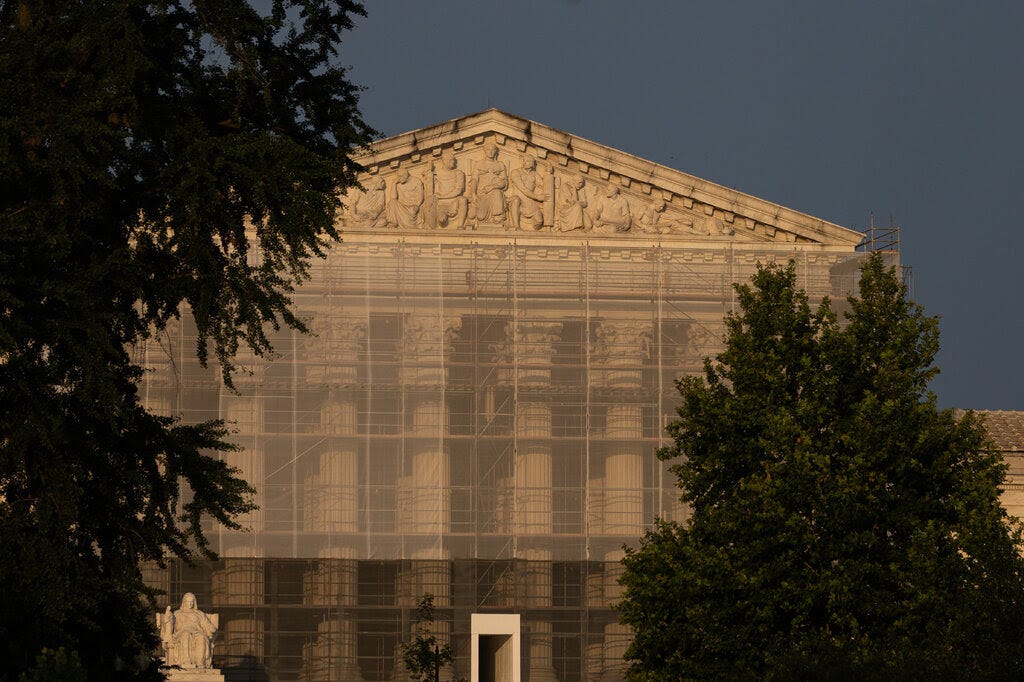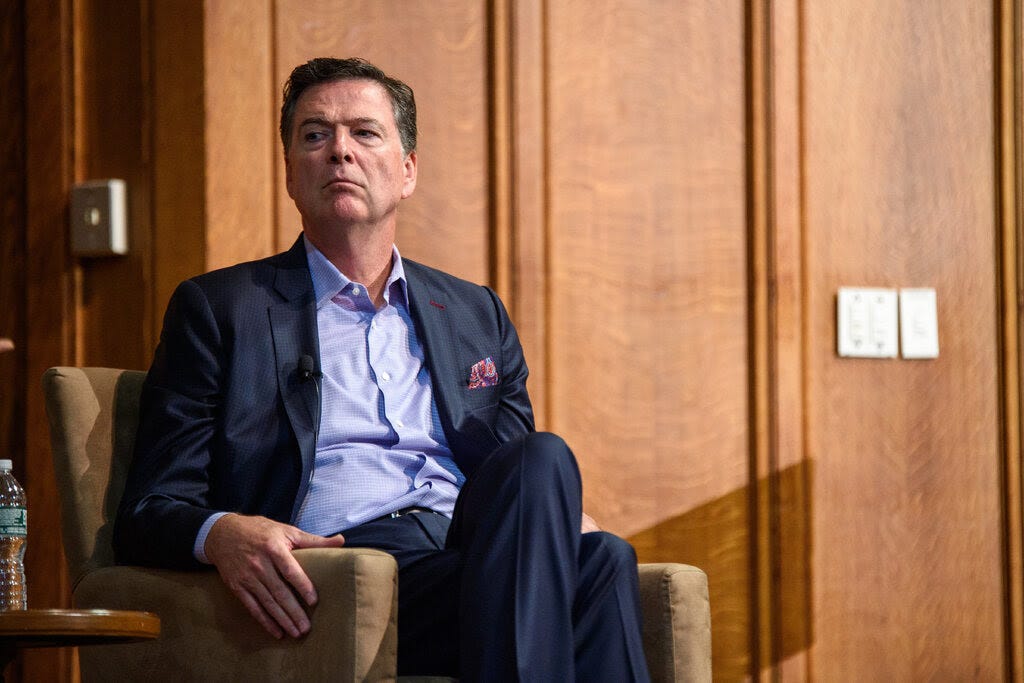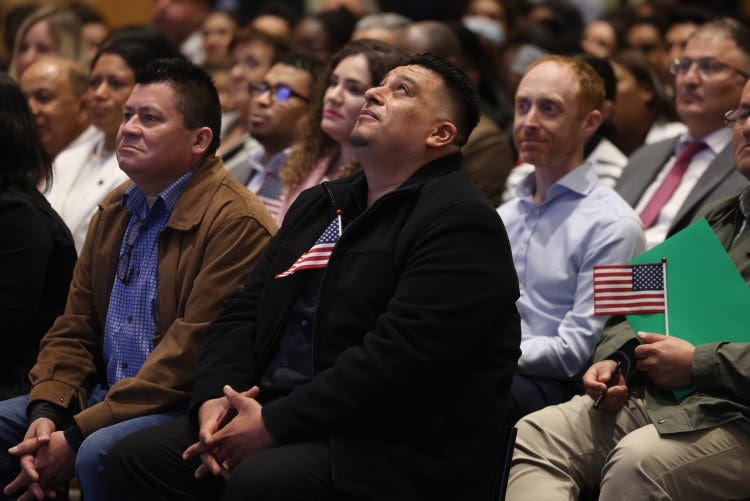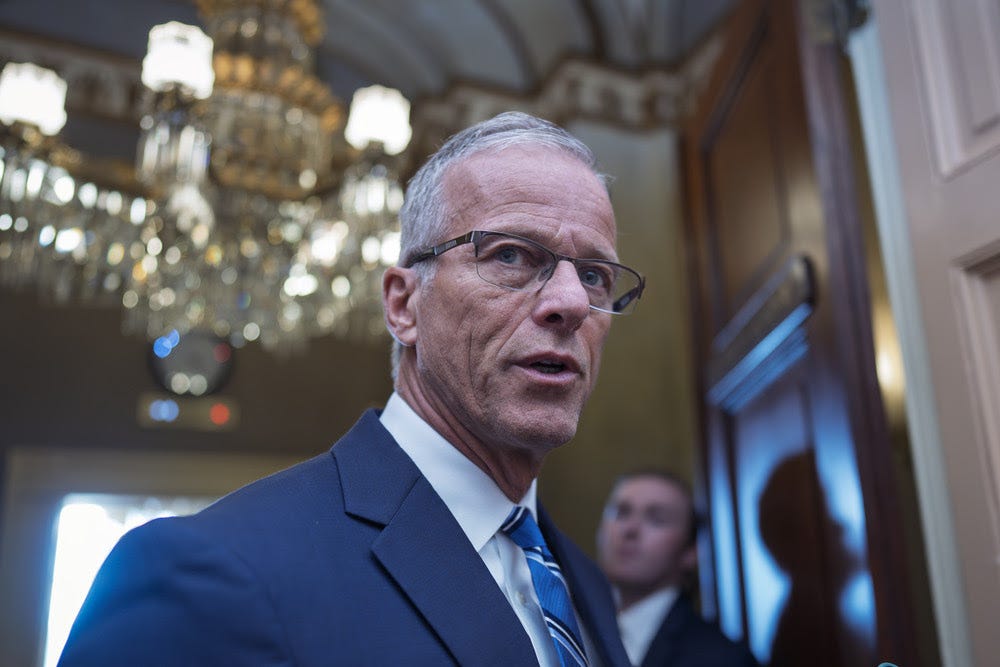President Trump is slapping Brazil with a 50% tariff starting Aug. 1.
“In a letter, he slammed Brasília for pursuing legal action against U.S. tech firms and former Brazil President Jair Bolsonaro, who’s on trial for an alleged coup attempt. Trump also hit seven more countries with tariff letters including Libya, Iraq and the Philippines; the levies range from 20% to 30%. Across the pond, the EU is aiming for an outline trade deal with the U.S. this month, and potentially within days, a spokesman said.” [Wall Street Journal]
Tierney L. Cross/The New York Times
Supreme Court Won’t Revive Aggressive Florida Immigration Law
“The law, enacted this year, made it a crime for unauthorized migrants to enter the state. The Supreme Court has given the Trump administration great leeway in pursuing its immigration agenda. The order suggested that it may take a different view of states’ power on this issue.”
Read more at Washington Posr
Monica Jorge for The New York Times
James Comey Was Tracked by Secret Service After Post Critical of Trump
“Law enforcement tailed the former F.B.I. director in unmarked cars and street clothes and tracked his cellphone the day after he posted an image on social media of seashells arranged to say ‘86 47.’”
Read more at New York Times
Trump's plan to denaturalize more Americans
Boston Globe via Getty Images
Nicole Narea is a senior politics reporter at Vox.
“President Donald Trump is reviving a familiar playbook to target naturalized US citizens.
The Justice Department recently announced a new push to strip certain people of their citizenship through denaturalization proceedings. Individuals who pose a danger to national security, have committed violent crimes, or fail to disclose a felony history (or make other misrepresentations) on their citizenship application are among those now being prioritized for denaturalization and deportation. In doing so, the administration is likely seeking to expand an authority that the Supreme Court drastically limited decades ago.
The news may rattle any of the estimated 24.5 million naturalized citizens currently living in the US. That might especially be the case for those who have voiced opposition to Trump, given that his administration has already weaponized immigration policy against dissidents.
Ostensibly, denaturalization is about protecting the integrity of the citizenship process. In practice, the new push ‘is about targeting speech the government doesn’t like, and it is chilling all naturalized citizens,’ said Amanda Frost, a professor at the University of Virginia School of Law and author of You Are Not American: Citizenship Stripping From Dred Scott to the Dreamers.
This wouldn’t be the first time denaturalization has been used as a tool of political repression. During the Red Scare following World War II, the US pursued denaturalization cases with an eye toward rooting out un-American behavior, both real and perceived.
In the 1950s and 1960s, a political movement known as McCarthyism — named after then-Sen. Joseph McCarthy — sought to purge anyone in government with connections to the Communist Party. Denaturalization was one of the tools McCarthyites relied on, and, at the height of the movement, the US was denaturalizing more than 20,000 people per year, said Cassandra Burke Robinson, a professor at Case Western Reserve University School of Law who has studied denaturalization.
In these cases, the government argued that if an individual became a member of the Communist Party at any time, that person had been lying when taking an oath of allegiance to the US as part of their citizenship test and, therefore, could be denaturalized. Later, that argument evolved to target Americans with disfavored political views or who were perceived as disloyal to the US more broadly, not just Communist Party members.
One primary target of denaturalization was members of the German American Bund, the American Nazi organization. However, targets also included political gadflies, such as labor leaders, journalists, and anarchists.
Denaturalizations decreased significantly, from tens of thousands to fewer than 10 annually, after the Supreme Court’s 1967 decision in Afroyim v. Rusk. In that case, the justices found that the US government does not have the power to denaturalize people without their consent because citizenship is guaranteed by the Constitution’s 14th Amendment.
For decades, the ruling meant that denaturalization was a rare phenomenon. However, the court included an exception for cases in which citizenship is ‘unlawfully procured’ — meaning they were not eligible for citizenship in the first place due to acts like committing war crimes. That’s what Trump is now relying on to revive the tactic.
Denaturalizations have been increasing since the Obama administration, when the digitization of naturalization records made it easier to identify individuals whose citizenship applications showed discrepancies with other government records. Most denaturalization cases during this period involved people who had committed acts of terrorism or war crimes.
But Trump made denaturalization a priority during his first administration, including targeting anyone who merely had errors on their naturalization papers. The DOJ launched a new section focused on denaturalization and investigated some 700,000 naturalized citizens, resulting in 168 active denaturalization cases — more than under any other modern president. It’s not clear how many of them were ultimately denaturalized and deported.
Trump is now picking up where he left off. The administration has said that it will pursue these denaturalization cases in civil rather than criminal court proceedings. In such proceedings, individuals are not entitled to an attorney, and the legal bar for the administration to prove that a citizen did something to warrant denaturalization is lower than it would be in criminal court. There is also no limit on how long after naturalization the government can seek to revoke someone's citizenship.
All of that raises due process concerns, and there’s also the question of to what degree this Supreme Court will be willing to rein in Trump’s denaturalization efforts.
Its 2017 decision in Maslenjak v. United States maintained a high bar for denaturalization, which makes Burke Robinson ‘somewhat hopeful that the court does take the issue very seriously.’
‘But that was 2017,’ she added. ‘It is a different court now, so it’s very hard to predict.’ “
You can read Nicole's full story here. [Vox]
Jul 09, 2025View in browser
By Eli Okun
Senate Majority Leader John Thune said a Russia sanctions bill may come up for a vote in the coming weeks. | J. Scott Applewhite/AP
“TO RUSSIA, WITH LOVE: Sen. Lindsey Graham’s (R-S.C.) bipartisan Russia sanctions bill may finally be gathering more momentum — even as Russian President Vladimir Putin wants to forge right ahead in attacking Ukraine regardless.
Heading for the Senate floor? Majority Leader John Thune said today that Congress has made ‘substantial progress’ on the bill from Graham and Sen. Richard Blumenthal (D-Conn.), which would impose heavy new penalties on the Russian economy to try to strengthen Ukraine’s position and negotiating hand. Thune said the Senate could pass it as soon as this work period, which ends Aug. 1, per POLITICO’s Jordain Carney.
The Trump question: The legislation already has backing from the vast majority of senators, and in the House, Speaker Mike Johnson said again today that he supports more Russia sanctions, Jordain and Mia McCarthy report. ‘We have to send [Putin] a message,’ Johnson said. Thune’s holdup has centered on the question of President Donald Trump’s support, and Graham said he’s changed the bill to give Trump more flexibility to act. Trump, who told voters he would end the war by the first day of his presidency, has grown increasingly fed up with Putin, this week castigating the Kremlin’s ‘bullshit’ and ‘meaningless’ niceties.
But but but: Putin has heard Trump’s growing frustration with him. He’s factored in the possibility of additional U.S. pressure. And he is pressing forward with newly aggressive attacks on Ukraine anyway, ‘convinced that Russia’s battlefield superiority is growing, and that Ukraine’s defenses may collapse in the coming months,’ NYT’s Anton Troianovski and Paul Sonne report. Analysts and sources close to the Kremlin tell them that Putin is willing to jettison a better relationship with Trump to bend Ukraine to his will and extract maximum concessions from Kyiv and NATO — without offering his own.
‘Mr. Putin has been prepared for Mr. Trump’s patience to snap,’ the Times writes. ‘He has understood … that Mr. Trump could eventually implement new sanctions.’ But even if Trump does pull the trigger on the sanctions bill — and even as he restarted the flow of defensive weapons — the U.S. and Europe seem unlikely to increase military aid significantly enough to alter the battle lines much. Instead, the legislation would aim to bolster the West’s leverage for a ceasefire deal.
On the ground: The congressional shift comes as the Ukrainian military said Russia launched its single-largest attack of drones on Ukraine last night, per the NYT.
MORE FROM THE SENATE: As the Russia sanctions bill bubbles up, there’s a lot more on the chamber’s plate — including next week’s big fight over the White House’s rescissions package for foreign aid and public broadcasting money. Thune will have a new member of his whip team for upcoming votes: Sen. Bernie Moreno (R-Ohio) is replacing Sen. Thom Tillis (R-N.C.), Semafor’s Burgess Everett scooped.
Nominations roundup: The Senate HELP Committee advanced Susan Monarez’s nomination as CDC director on a party-line vote, per POLITICO’s Sophie Gardner. … Later today, the Senate will vote to confirm Bryan Bedford as FAA administrator and Scott Kupor as Office of Personnel Management director. … At Neil Jacobs’ confirmation hearing to be NOAA administrator, Sen. Jerry Moran (R-Kan.) warned that the government’s hiring freeze was hurting meteorology, per POLITICO’s Ben Johansen.” [POLITICO]
President Donald Trump speaks during a news conference with Elon Musk in the Oval Office of the White House, Friday, May 30, 2025, in Washington. | Evan Vucci/AP
“THE EPSTEIN FILES — Jeffrey Epstein has been dead for almost six years, but conspiracies surrounding his toxic legacy continue to animate Republican politics.
No one understands that better than Elon Musk, who is now gleefully and expertly wielding it against President Donald Trump. It’s the Tesla CEO’s tacit reminder to the president that he understands the president’s coalition and its pressure points — and he has no qualms about squeezing them.
Epstein — the disgraced New York financier with a private island allegedly used for sex trafficking minors and as a getaway for his powerful friends — died in 2019 while under surveillance in prison. Since then, the circumstances of his death have become the subject of what is arguably MAGA’s best-known and most enduring conspiracy theory. To many in the movement, Epstein was a manifestation of the degenerate behavior that they believe marks elite American society. And his violent fate confirmed to them the lengths to which moneyed elites — with the help of the so-called deep state — will go to cover up their crimes.
Trump’s election was supposed to bring about a reckoning. Many MAGA adherents expected the new president and a reconstituted Justice Department would shine a spotlight on Epstein’s alleged ‘secret client list’ and the truth behind his death while in custody.
When that didn’t come — a Justice Department memo released Monday stated that there was no evidence Epstein had a ‘secret client list”’ and that Epstein died by suicide —it was not received well by the online right and many of the president’s most ardent supporters.
Musk has learned a few things since joining Trump onstage to endorse him last year, bankrolling his presidential campaign and romping around the Oval Office and Cabinet meetings. Among them: how to stir up the MAGA base.
It explains why, as he publicly feuds with Trump, Musk has picked the Epstein scab over and over in the past 24 hours — he posted or reposted Epstein-related complaints about the Trump administration eight times on X, sandwiched in between posts about his potential new political party. Some of the posts include an old clip of him on Joe Rogan’s podcast in which he stated ‘Whenever they raided Epstein's place, there would have been a mountain of evidence. Where is that mountain? … The public will be rightly frustrated if no one is prosecuted.’ Then came a very simple question: ‘How can people be expected to have faith in Trump if he won’t release the Epstein files?’ That post has over 483,000 likes and has been viewed 47 million times on X.
In June, when Musk and Trump had their first public feud, Musk employed the same trick. He played the Epstein card right away, signaling to Trump that he was no ordinary political foe. In a now deleted post, Musk wrote, ‘Time to drop the really big bomb: @realDonaldTrump is in the Epstein files. That is the real reason they have not been made public. Have a nice day, DJT!’
Musk understands a simple fact about Trump’s most devoted supporters: They believe Trump when he says he’ll drain the swamp, when he rails against the elites and when he insists that he will look into the conspiracies that have proliferated online, whether about Epstein or anything else. When Trump is perceived to be failing at that, it’s far more damaging than any criticism Democrats throw at the president.
Some of Trump’s best-known allies have given voice to the anger and deep frustration over the lack of Epstein revelations.
‘The whole thing that this tape shows that he didn’t kill himself is like a joke, but worse than that it’s a joke that we all get. I feel like we’re at a dangerous point now,’ Tucker Carlson said.
‘Now, by coming in and becoming part of the coverup, the Trump administration has become part of it. You cannot see it any other way,’ Infowars host and conspiracy theorist Alex Jones said in a video recorded in his car. ‘So, I just got to the office, I’m going to throw up actually. This only happens every few years when something really, really bad happens, I’m physically going to puke probably right now.’
In a press conference on Tuesday, Trump inadvertently revealed that it’s gotten under his skin. He responded to a question about Epstein by saying, ‘Are you still talking about Jeffrey Epstein? This guy’s been talked about for years … are people still talking about this guy, this creep? … I can’t believe you’re asking a question about Epstein.’
Musk, who seems to be on X all day, every day, understands the MAGA ecosystem perfectly. The new political party he’s called for might not take off. But where the billionaire mogul can be a formidable enemy is online, where he controls the levers of the X algorithm and can shape public opinion around questions that are fundamental to Trump's appeal and his connection to the party base. He knows MAGA-world and how to push its buttons. And he’s not afraid to do so, starting with thorny questions about a long dead sexual deviant that he won’t let go away.” [POLITICO}
INTERNATIONAL
European intelligence officials warn that a Russian sabotage campaign is escalating
“European intelligence officials say they’re worried the risk of serious injury or even death is rising in a campaign of sabotage blamed on Russia as untrained saboteurs set fires, plant explosives, or build bombs. The Associated Press' tracking shows 12 incidents of arson or serious sabotage last year. Read more.
What to know:
Most of the saboteurs accused of working on behalf of Russia are foreign, including Ukrainians. They include young people with no criminal records who are frequently hired for a few thousand dollars, the intelligence officials said. A senior official said Russia has been forced to rely increasingly on such amateurs since hundreds of Moscow’s spies were expelled from Western countries following an operation to poison former Russian intelligence officer Sergey Skripal in the U.K. in 2018.
On Tuesday, a British court found three men guilty of arson in a plot that prosecutors said was masterminded by Russia’s intelligence services. A fire was set at a warehouse storing goods destined for Ukraine. The Kremlin did not reply to a request for comment on the British case.
Documents shared during the warehouse trial offered a rare glimpse into how young men are recruited. Among those were transcripts of messages between a man prosecutors said was a Russian intelligence operative and his recruit, Earl, who was active on Telegram channels associated with the Wagner group. The recruiter told Earl, 21, that he was ‘wise and clever despite being young,’ and suggested he watch the television show ‘The Americans’ — about Soviet KGB intelligence officers undercover in the U.S. Earl and another man eventually recruited others who went to the warehouse the night of the fire.” [AP News]
The Philadelphia trash strike is over
“A strike that left the streets of Philadelphia lined with trash is ending. Mayor Cherelle L. Parker said a tentative agreement will put an end to a work stoppage that began June 30. That agreement boosts the city's blue-collar workers' pay by 14% over four years, Parker said in a social media post. ‘The strike is over!’ the American Federation of State, County and Municipal Employees District Council 33 posted to social media in the early morning hours of July 9. Photos showed piles of trash along streets and vacant lots during the strike.” [USA Today]
Trash and recycling pile up as the DC33 (District Council 33) Union strike entered its second week on July 8, 2025 in Philadelphia, Pennsylvania.
Matthew Hatcher, Getty Images
INTERNATIONAL
Vladimir Putin and Donald Trump. Marcos Brindicci/Reuters
Putin’s error
“I cover international security.
Trump and Putin’s relationship has curdled. It’s a strange turn, given how good things looked for Russia after Trump’s election. The new president seemed to regard Putin respectfully, and Putin seemed poised to get much of what he wanted in his war against Ukraine. Instead, Putin badly misplayed his cards. In today’s newsletter, I explain how he turned a potential White House ally into a skeptic.
A bright start
Trump promised during the campaign to quickly end the war in Ukraine. When he took office, his administration was skeptical about Ukraine’s NATO aspirations, ready to let Russia control the Ukrainian territory it had taken, disinclined to spend a lot on Kyiv’s defense and even open to recognizing Moscow’s 2014 annexation of Crimea. It was a peace offering that achieved many of Russia’s war aims.
Then came Volodymyr Zelensky’s disastrous Oval Office visit in February. Trump belittled Zelensky as an ingrate on live TV, insisting, ‘You don’t have the cards right now.’ He also said Putin had been the victim of an American witch hunt. The U.S. began pressing Ukraine to sign an agreement handing over much of its mineral wealth.
All of this came at the perfect time for Russia. It had lost about a quarter-million soldiers in the war. Its economy was weak. But with a sympathetic American president, Putin was in reach of claiming victory.
A shot in the foot
In Kyiv this week. Gleb Garanich/Reuters
But Putin was not ready to settle. Just as he did when he invaded Ukraine in 2022, he believed he could get everything he wanted. In his hubris, he repeatedly rebuffed Trump’s push for a cease-fire. He continued to pound Ukraine with horrific drone attacks.
Meanwhile, he pushed on the battlefield, trying to take more land and weaken the Ukrainian government. While his precise designs are not clear, some American officials think he wants to conquer Kherson, Odessa or even Kyiv — major Ukrainian cities. American officials think this ambition is delusional.
Trump watched all this with increasing alarm. In April, after a Russian missile and drone barrage on Ukraine, Trump posted online: ‘I am not happy with the Russian strikes on KYIV. Not necessary, and very bad timing. Vladimir, STOP!’
A turnabout
Now Trump criticizes Putin, not Zelensky. After a half-dozen calls with Putin this year, Trump appears to have changed his view of the man. This week, he bluntly said he was not happy with Putin because he was killing Ukrainians. ‘We get a lot of bullshit thrown at us by Putin, if you want to know the truth,’ Trump said. ‘He’s very nice to us all the time, but it turns out to be meaningless.’
Coming from almost any other politician in Washington those words would not be surprising. But for Trump to say them shows how much Putin has alienated the White House — and potentially wasted his chance for a negotiated peace.
Trump has resumed weapons shipments to Ukraine after a brief pause by the Pentagon. Senate Republicans are pushing a new set of sanctions against Russia. Trump is considering the proposal.
Ukraine is war weary, but its will to fight remains, especially if Russia pushes onward. It is innovating on the battlefield, and its drones exact a heavy toll on the Russian Army. Pledges of support from Europe and more air defense from the U.S. will make it very tough for Putin to end the war by force.
For more: Russia launched a record number of drones and missiles at central and western Ukraine.” [New York Times]
Overnight Attack
Rescue teams work in a building destroyed by a Russian missile, seen in Kyiv on June 23. Ximena Borrazas/Middle East Images via AFP
“Russia fired hundreds of drones at Ukraine early Wednesday in a massive barrage that Ukrainian President Volodymyr Zelensky said marked a record number of aerial targets in a single day during the war.
The attack involved 728 drones and 13 missiles, Zelensky said in a post on X, and mainly targeted Lutsk—a city in northwestern Ukraine, near the Polish border, that is home to military airfields. The Russian Defense Ministry said that the assault focused on Ukrainian air bases and hit ‘all the designated targets.’ Ukrainian officials said that at least one person was killed in the attack..
‘This is a telling attack—and it comes precisely at a time when so many efforts have been made to achieve peace, to establish a ceasefire, and yet only Russia continues to rebuff them all,’ Zelensky wrote on X. Beyond Lutsk, damage was also reported in 10 Ukrainian regions, he said.
The Kremlin’s latest assault comes at a tenuous point in Russia’s full-scale invasion of Ukraine—which has now stretched past its third year—particularly as U.S. support for Kyiv has wavered under U.S. President Donald Trump. Frictions between Trump and Zelensky were on full display in February, when the U.S. leader and Vice President J.D. Vance publicly and repeatedly berated their Ukrainian counterpart in front of news media in an Oval Office meeting.
Trump’s stance on Ukraine now appears to be turning a new page as his frustration with Russian President Vladimir Putin has grown and peace talks have faltered. On Monday, U.S. senior envoy for Ukraine Keith Kellogg accused Russia of stymying peace talks, which the Kremlin denied. “Russia cannot continue to stall for time while it bombs civilian targets in Ukraine,” Kellogg said.
That same day, Trump announced that the United States would resume weapons shipments to Ukraine to help boost the country’s defenses.
“They have to be able to defend themselves. They’re getting hit very hard,” he said on Monday. “We’re going to have to send more weapons, defensive weapons, primarily, but they’re getting hit very, very hard. So many people are dying in that mess.”
The White House had announced last week that the Pentagon was pausing some of those shipments, citing the need to conserve the United States’ own weapons stockpiles. The move stunned Kyiv and its European allies, as well as a number of Republicans in Congress.
It also reportedly surprised State Department officials and may have even caught Trump himself off guard. When asked by CNN’s Kaitlan Collins on Tuesday who had approved the pause, Trump—who was sitting next to his defense secretary in a cabinet meeting at the time—deflected, firing back at Collins: “I don’t know. Why don’t you tell me?”
Still, Trump reiterated that the weapons would again start flowing to Kyiv, saying that Putin was “not treating human beings right.” He’s “killing too many people, so we’re sending some defensive weapons to Ukraine,” Trump said.
The White House is now weighing sending Kyiv another Patriot air defense system, the Wall Street Journal reported on Tuesday. If that happens, it would be the first time that Trump has authorized sending a major weapons system to Ukraine, outside of what was approved by his predecessor.
“Police raid. French authorities raided the headquarters of the far-right National Rally party on Wednesday, during which they seized documents and accounting records. The raid was part of an official probe into the party’s campaign finances and aims to investigate allegations of financial impropriety during its 2022 presidential campaign, 2022 legislative campaign, and 2024 European Parliament election campaign, according to the Paris prosecutor’s office. No charges have been made, and the party has denied any wrongdoing.
This is not the first such investigation to plague the National Rally, which has surged in popularity in recent years and is now a powerful force in French politics. The party’s former president, Marine Le Pen, was convicted of embezzlement earlier this year and is now prohibited from running for public office for five years. She has appealed the decision.
The party, for its part, condemned the raid. ‘This deployment of force has only one aim: to put on a show for the news channels, to search the private correspondence of the leading opposition party, to seize all our internal documents,’ Jordan Bardella, the party’s president, said in a post on X. ‘Nothing to do with justice, everything to do with politics.’” [Bloomberg]
“Nationwide strike. Indian Prime Minister Narendra Modi’s big plans to privatize state-run companies are facing steep resistance. Hundreds of thousands of workers in the country launched a nationwide strike on Wednesday to protest Modi’s privatization bid and other economic policies in a sweeping demonstration spearheaded by a coalition of 10 major trade unions.
The striking workers are calling for higher wages, the end of Modi’s privatization bid, the removal of new labor laws, and efforts to plug vacancies in government jobs, The Associated Press reported, while striking farmers are demanding a higher minimum crop purchase price. New Delhi has not officially responded to the strike.” [Bloomberg]
“Repatriated. On Wednesday, South Korea returned to its northern neighbor six North Korean fishermen who accidentally floated into South Korean waters months ago, Seoul’s Unification Ministry said. The fishermen were found in two separate instances—four in May and two in March—after their boats’ engines failed, according to South Korean officials.
The fishermen had clearly expressed interest in returning to North Korea, South Korean officials said. But Pyongyang did not respond to Seoul’s efforts to communicate and coordinate their repatriation, further complicating what is already a delicate and controversial issue in the region. Ultimately, South Korean officials decided to return the fishermen—citing humanitarian reasons—and they were met by a North Korean patrol boat on Wednesday.” [Bloomberg]
BUSINESS AND ECONOMY
Nvidia beats Apple and Microsoft to become the world’s first $4 trillion public company
“Nvidia on Wednesday hit $4 trillion in market value, making it the first publicly traded company to hit that milestone.
The US chipmaker has had a remarkable march to record highs and has soared 22% this year, thanks to its leading role powering the artificial intelligence boom.
Nvidia beat Apple and Microsoft to the $4 trillion mark. Apple entered this year as the world’s most valuable company at just about $3.9 trillion before tumbling in recent months amid President Donald Trump’s tariff turmoil. Nvidia and Microsoft traded places as the world’s most valuable company in recent months, before Nvidia surged ahead to reach the $4 trillion mark first.”
Read more at CNN
Linda Yaccarino said she’s stepping down as CEO of X, capping a tumultuous run atop Elon Musk’s social-media company.
“Her future there had been uncertain for months. After Musk merged X with Grok chatbot maker xAI this spring, AI’s high-growth potential became more important to investors than the tighter-margin business Yaccarino oversaw. Separately, Grok published antisemitic posts, several of which were later deleted. xAI said it’s working to ban hate speech before the chatbot posts on X. In May, Grok posted about the ‘white genocide’ of non-Black South Africans in response to wholly unrelated prompts.” [Wall Street Journal]
Ferrero Nears Roughly $3 Billion Deal for Kellogg
“The Italian candy maker behind Ferrero Rocher and Nutella is nearing a roughly $3 billion deal to buy the breakfast-cereal conglomerate WK Kellogg, according to people familiar with the matter.
Ferrero could finalize the deal for the iconic U.S. cereal company as soon as this week, the people said.”
Read More at Wall Street Journal
“A US appeals court blocked a rule that would have required businesses to make it as easy to cancel subscriptions and memberships as it is to sign up, saying the agency that created it did not follow protocol.” [Reuters]
What Trump’s sweeping domestic policy law means for American workers
By Alicia Wallace, CNN
President Donald Trump's new tax law includes a deduction for some tips. However, not all workers will qualify.
Yuki Iwamura/Bloomberg/Getty Images
CNN —
“President Donald Trump’s megabill is now a megalaw with wide-reaching implications for many Americans.
Trump has touted that his tax and spending law will boost the economy and put more money in people’s pockets, especially for hourly workers.
However, as is the case with most federal laws — especially one that’s nearly 900 pages long and peppered with plenty of eleventh-hour additions — the outcomes aren’t always that cut and dry.
The law’s passage ‘happened overnight and on a holiday weekend,’ said Nisha Verma, a partner in Dorsey & Whitney’s labor and employment practice. ‘This will change the lives of Americans, but exactly how still has to be examined.’
Here’s a quick look at some of the more notable provisions that could have a significant impact on American workers:
No tax on tips
In the 2024 presidential campaign, both Trump and Vice President Kamala Harris supported tax-free tips. However, some tax experts and economists balked at such proposals, claiming that costs could outweigh the benefits and that such a law could have ripple effects such as keeping a lid on lower-earning workers’ wages and creating a deduction that could be abused.
Under the One Big, Beautiful Bill Act, workers who received qualified tips will be able to deduct $25,000 of those tips annually from their taxable income. The provision, which has an income cap of $150,000 ($300,000 in the case of a joint return jointly), will be retroactive in a way, because it will apply to the 2025 tax season.
The cut is considered an above-the-line deduction, meaning that it would apply to taxpayers who take the standard deduction in addition those who itemize.
However, like ‘no tax on overtime,’ this isn’t a permanent tax break: It’s set to expire at the end of 2028.
‘Qualified tips’ include cash tips paid voluntarily to a person who works in a job or business that traditionally is tipped. The Treasury Department is expected to release further guidance on the qualifying occupations and industries.
On the surface, ‘no tax on tips’ sounds like a clear benefit to workers; however, it’s not that simple, economist Martha Gimbel, executive director and co-founder of the Budget Lab at Yale, told CNN.
‘You may be reading about this in the news and you see, no tax on tips and think, ‘That seems great for me,’ and you’re not taking the time to think about, ‘well, wait a minute, I already wasn’t paying federal income tax on my tips, because I made too much or too little money.’
No taxes on tips also could have some unexpected ripple effects throughout the labor market and, particularly, the service industry, Dorsey & Whitney’s Verma said.
‘Now that tips are more valuable, does that mean that rules like tip pooling … are going to be more scrutinized?’ she said. ‘Are we going to see servers challenging the pooling rules?’
And, with tips gaining in value, that could also disincentivize employers from raising wages and policymakers from considering a higher tipped minimum wage, which sits at $2.13 an hour, she said.
‘Yes, the person’s getting a benefit by not having to pay taxes on their tips, but there’s other challenges that come along with relying on tips for your income, such that you may be subject to more sexually harassing behavior, or you may not be able to advocate for yourself as much as you would want to in front of customers when you don’t even have the security of $7.25 an hour from your employer,’ she said.
No tax on overtime
This above-the-line deduction would allow for up to $12,500 ($25,000 in the case of a joint return) in qualified overtime compensation to be deducted for those who earn $150,000 ($300,000 joint) and under. It would apply to overtime over 40 hours per week.
This provision also would take effect for the 2025 tax year and expire at the end of 2028 and apply to only federal taxes.
While no tax on overtime proposals have gained popularity across various US states, critics have cautioned that they could backfire by encouraging excessive working hours and could open the doors for higher earners to game the system.
Still, the nuts and bolts of how the deduction could be applied — and whether employers will have enough time to get their tax houses in order — remain to be seen, Verma said.
‘Not all employers only pay overtime on a federal level, which requires time and a half after 40 hours worked,’ she said. ‘There are four states (plus Oregon in some industries) where there’s a requirement on the state level to pay overtime if the person exceeds a certain number of hours worked per day.’
‘Most wage statements that I’ve seen do not pull apart or designate whether an hour is being paid to you because you hit more than eight hours a day or because you hit more than 40 hours a week,’ she added.
Workforce training, child care, student loans
Workforce Pell Grants: This provision would extend the venerable federal need-based education grant to students in an eligible workforce program for high-skill, high-demand and high-waged jobs.
By extending Pell grants into a broader array of programs, including short-term and postsecondary offerings, proponents say this could help address a critical need: Training more skilled workers.
The provision is expected to take effect July 1, 2026, and apply to programs that provide between 150 and 600 hours of instruction during between eight and 15 weeks.
Enhancement of employer-provided child care credit: This provision increases the tax credit for employers who provide child care to their employees. Starting in the 2026 tax year, businesses can deduct up to 40% of qualified child care expenditures up to $500,000. The provision also expands the credit to small businesses, who can deduct up to 50% of their qualified expenses up to $600,000.
Accessible, available and affordable child care has been shown to boost labor force participation, particularly among women. However, recent data has shown that employer-provided child care is usually limited to larger firms and fewer than 300 firms took the credit in 2016 (according to the Washington Center for Equitable Growth, which flagged a 2022 US Government Accountability Office report).
Exclusion of employer payments of student loans: The OBBB makes permanent a law that allowed employers to offer up to $5,250 in tax-free student loan repayment assistance. And, starting in the 2026 tax year, that amount would be adjusted for inflation in $50 increments.
The continued tax break isn’t likely to benefit all student loan borrowers. Research from the Brookings Institution found that 9% of workers in the top 25% of earners had access to student loan repayment benefits versus just 3% of workers in the bottom 25% of earners.
The biggest beneficiaries will be higher-earning, white-collar workers at large employers, according to Brookings.” [CNN]
SPORTS
CHET HOLMGREN AND THE OKLAHOMA CITY THUNDER ...
“The Thunder grew from upstarts to champions in the blink of an eye. Now, their stars' bank accounts are growing, too. Chet Holmgren agreed to a fully guaranteed five-year maximum rookie extension worth up to $250 million. It comes shortly after Oklahoma City signed Shai Gilegous-Alexander to a four-year, $285 million extension.
Holmgren, 23, has been a defensive menace for the Thunder, who boasted an all-time great defense. His 2.3 blocks per game over the past two seasons are third in the NBA behind Victor Wembanyama and Walker Kessler.
Overall, Holmgren has averaged 16.1 points, 7.9 rebounds and 2.3 assists in his two seasons.
Injuries have been a big storyline, too, though. He missed his entire first season with a foot injury and played in just 32 games this season due to a pelvic fracture.
Yes, it's a ton of money, but Holmgren actually did the Thunder a financial favor considering Paolo Banchero just signed an extension worth up to $287 million, Sam Quinn explains.
Quinn: "If a player in Banchero's or Holmgren's position makes an All-NBA Team or wins Defensive Player of the Year in the most recent season or two of the previous three seasons, or wins MVP in any of the previous three seasons, he becomes eligible instead for a contract up to 30% of the cap. That is where Banchero's $287 million figure comes from. ... Holmgren, a legitimate Defensive Player of the Year candidate with a reasonable chance of making an All-NBA Team under the right circumstances, did not sign a deal that could take him up to $287 million."
So Holmgren gets paid, and if he produces like he can, the Thunder still potentially saved some money. It's a win-win for a young team and a young player player who have already done a lot of winning.
... AND ALSO A GOOD MORNING TO DEVIN BOOKER
Holmgren's money is awesome. Devin Booker's money is historic: a two-year, $145 million max extension with the Suns, the largest per-year extension in NBA history ($72.5 million). Overall, Booker, 28, has five years and $316 million on his contract, which runs through 2029-30.
Booker, 28, is a good player. A great player, even: a four-time All Star and two-time All-NBA selection.
But the Suns, unlike the Thunder, are going nowhere. They've been one of the most disappointing teams of the past couple of years, in fact. Booker becoming the highest-paid player in a league where he's probably a top-20ish player is, simply, a massive overpay by a directionless organization, Sam writes.” [The Athletic]


















